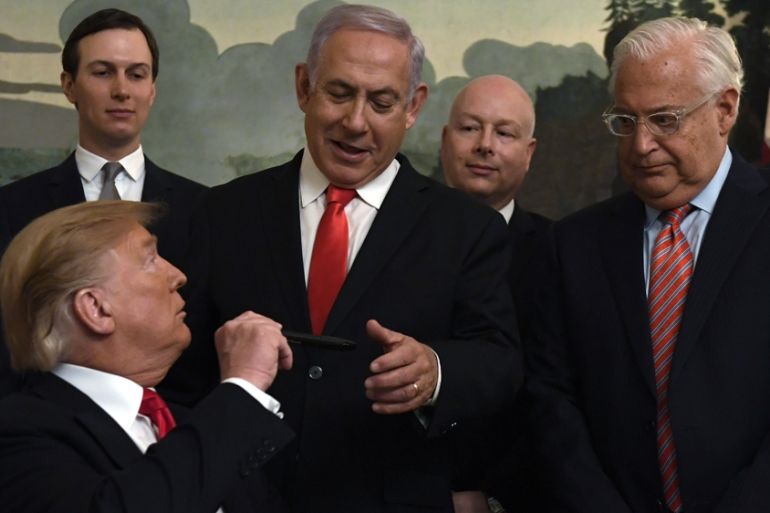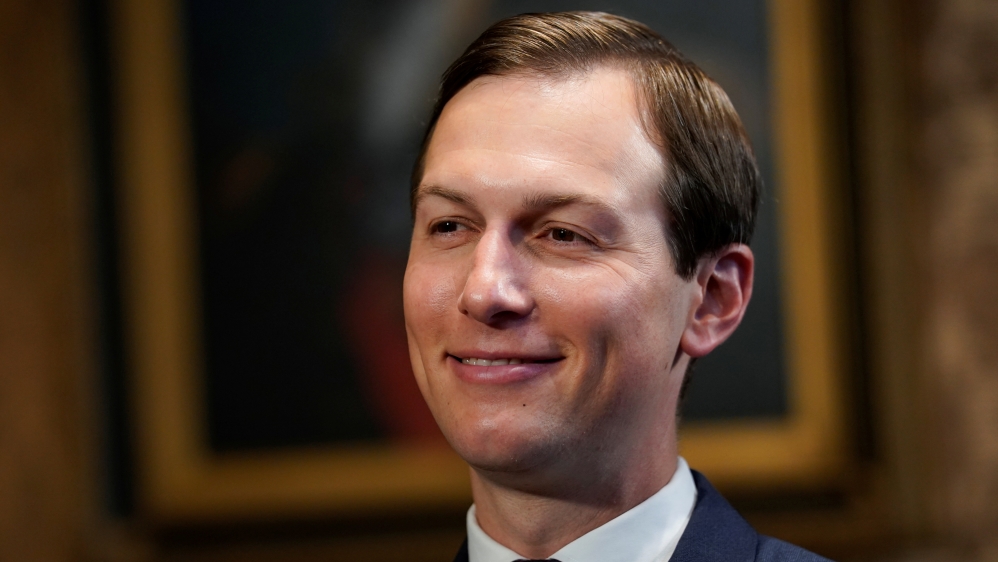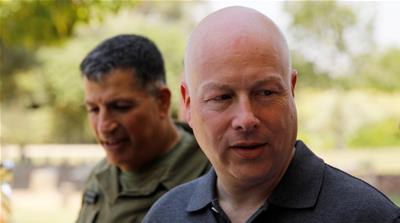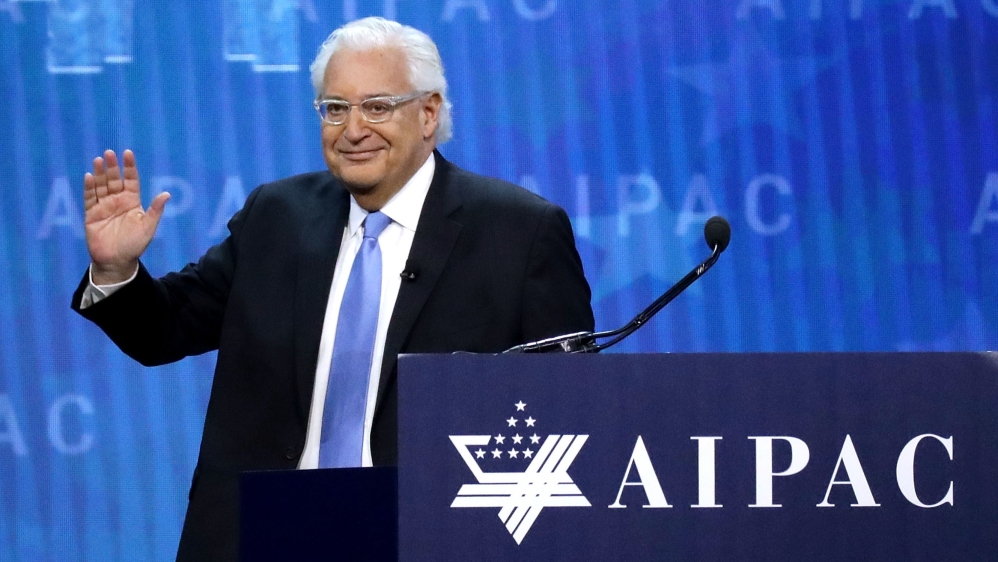The architects behind the US plan for Middle East peace
Jared Kushner, David Friedman, Jason Greenblatt in charge of US-Middle East peace plan despite no political experience.

There are at least three things that Jared Kushner, David Friedman and Jason Greenblatt all have in common. One is that they are all Orthodox Jews, and another is that prior to their appointment as officials in the Trump administration, all three men had no prior political or diplomatic experience.
The third is that this triad has connections to Israel, or more specifically, to the illegal settlements in the occupied West Bank.
Keep reading
list of 4 items‘Hell on Earth’ as violence escalates in Sudan’s el-Fasher
South Korean military says North Korea test-fired ‘ballistic missiles’
Western volunteers join the battle against Myanmar’s military regime
Both Friedman and Kushner, through a family charity, have for years donated to the hardline Bet Il settlement, located on land belonging to the Ramallah area. Greenblatt studied at a yeshiva during the 1980s at a settlement bloc near Jerusalem, where he also guarded it with an M-16 assault rifle.
All three men were deemed by President Donald Trump as the best candidates to draft a US plan for Middle East peace, a task that not only is daunting in scope, but one that requires an immense amount of political finesse.
The plan, which has been dubbed the “deal of the century”, shies away from decades of US foreign policy in the Middle East, where previous administrations preferred a two-state solution as the most practical political settlement regarding the Israel-Palestine conflict.
It envisioned an Israeli state alongside a Palestinian one based on the 1967 borders, with occupied East Jerusalem as the Palestinian capital.
Yet Kushner et al chose to tackle their mission by using a different approach: focusing on the economic prospects of the Israel-Palestine conflict, and despite being in the third year of Trump’s presidency, keep mum about the political aspect, which will be discussed at an unknown future date.
The economic aspect will be addressed in a two-day “workshop” starting on Tuesday in Bahrain’s capital, Manama. Neither the Palestinians – who are boycotting the event and severed ties with the US over what they call its “pro-Israel bias” – nor the Israelis will be present in an official capacity.
Dubbed “Peace to Prosperity” by the White House, the meeting largely revolves around the creation of a $50bn global investment fund, of which $28bn will be invested directly into the economies of the occupied West Bank and Gaza Strip in the form of business ventures.
According to the Washington Post, “Kushner and other US officials have linked peace and economic development to Arab recognition of Israel and acceptance of a version of the status quo on Palestinian ‘autonomy’ as opposed to ‘sovereignty’.”
The event has been criticised by Palestinians across the political spectrum as a plan to buy out Palestinian rights, without addressing core political problems – chiefly the Israeli occupation that has devastated the day-to-day lives of Palestinians for decades.
Al Jazeera takes a closer look at the architects behind the US attempt at Middle East peace.
Jared Kushner

Kushner is a White House senior adviser and has been primarily tasked with heading the US efforts for a Middle East peace plan.
The 38-year old is also Trump’s son-in-law having married Ivanka – known as Trump’s favourite out of his five children – in 2009.
He also serves as the president’s lead adviser on relations with China, Mexico and Canada.
Prior to his official role, Kushner was a real estate developer and CEO of the family company after taking the reins from his father, Charles.
Kushner was also chairman and publisher of Observer Media, which he bought in 2006.
He attended Harvard after his father gave the university a $2.5m donation. Doubts have been raised about whether the younger Kushner was admitted based on merit alone, or because of his father’s generous tax-deductible offering.
His role in the White House has been criticised not only for nepotism, but also for cashing in on business opportunities – a conflict of interest. According to investigative journalist Vicky Ward, Kushner did not disclose his stake in Cadre, an online commercial real estate broker he founded in 2014 with his brother, Joshua. In 2018, his stake went up to $50m.
The Kushner family regards Israeli Prime Minister Benjamin Netanyahu as a family friend, who during trips to the United States would visit their home. Sometimes if Netanyahu spent the night he would sleep in Jared’s bedroom.
Kushner’s parents became known as among the most prominent funders of Democratic politicians on the East Coast. Trump ran as a Republican.
In an interview earlier this month, Kushner said he remains uncertain about the ability of Palestinians to govern themselves.
“The hope is that over time they can become capable of governing,” he told Axios on HBO, when asked about whether Palestinians can expect freedom from Israeli interference.
Jason Greenblatt

A lawyer by trade, Greenblatt worked for Trump for nearly two decades as an executive vice president and legal counsel at the Trump Organization.
He was appointed by the president as the US envoy for international negotiations and Trump’s special adviser on Israel.
In 2016, Trump told reporters that Greenblatt is “a person who truly loves Israel”.
“I love to get advice from people that know Israel, but from people that truly love Israel,” Trump said.
Greenblatt has said his main sources of information about the Israel-Palestine conflict come from daily email alerts, the powerful Zionist lobby group American Israel Public Affairs Committee (AIPAC), and a weekly Jewish radio programme.
“I also speak to people that I would say are involved in the Israeli government at certain levels and hear their thoughts,” Greenblatt said.
He admitted prior to his appointment by Trump that he had no Palestinian contacts, and the last time he met a Palestinian was when he was a yeshiva student at the Yeshivat Har Etzion settlement bloc in the occupied West Bank more than 30 years ago.
Greenblatt has previously shown an aversion to the two-state solution. In April he said “there is no reason to use the term” because “every side sees it differently”.
Much like his boss Trump, Greenblatt often takes to expressing his opinions and carrying out informal diplomacy on Twitter, often sparring with officials from the Palestine Liberation Organization (PLO).
During an informal Security Council meeting last month, Greenblatt said the council’s “obsessive” focus on Israeli settlements is a “farce”. Settlements – which under international law are illegal and have been a major roadblock in peace talks – aren’t keeping Israel and the Palestinians from negotiating peace, he said.
He has also blamed the main UN Palestine refugee agency, UNRWA, for prolonging the Palestine refugee problem. Last year the US cut off its roughly $300m annual donation to UNRWA.
Greenblatt has previously likened the Middle East peace process to a business transaction.
“If you take out the emotional part of it and the historical part of it, it is a business transaction. Land is going to be negotiated, water rights are going to be negotiated, security issues are going to be negotiated,” he said in 2016.
David Friedman

Appointed as US ambassador to Israel in 2017, Friedman was formerly a bankruptcy lawyer affiliated with the Trump Organization. He was also Trump’s campaigner adviser.
His strong support for Israel and its settlement enterprise is showcased in heading the American Friends of Bet Il Institutions, where he also donated money to the settlement for many years. The organisation, which actively supports the expansion of settlements in the occupied West Bank, is committed to opposing the two-state solution.
Far from adopting a politically neutral stance that is expected of ambassadors under international diplomatic protocol, Friedman has not minced his words regarding his support for Israel.
On the eve of the 71st Nakba anniversary – which commemorates the ethnic cleansing of more than half the Palestinian population in 1948 by Zionist paramilitaries – Friedman also claimed Israel’s secret weapon was it was “on the side of God”.
Earlier this month, Friedman angered Palestinians by saying: “Under certain circumstances, I think Israel has the right to retain some, but unlikely all, of the West Bank.”
The US envoy’s words echoed Netanyahu’s speech just before he swept to victory in Israel’s elections last April, when the prime minister declared his intention is annex part of the West Bank.
The Palestinian foreign ministry issued a statement rebuking Friedman as being “ignorant in political work”.
“Friedman’s remarks are an extension of the US administration’s policy, which is fully biased in favour of the occupation and its expansionist colonial policies,” it said.
The ministry added it is considering whether Friedman’s “racist rhetoric” is enough to submit a complaint against him to the International Criminal Court (ICC) for “threatening peace and security in the region”.
Friedman’s influence resulted in the Trump administration dropping the word “occupied” from official US references to Palestinian territories, and to close the PLO office in Washington, DC last year.
He also lobbied Washington to refer to the occupied West Bank by its biblical name used by Zionists, “Judea and Samaria”.